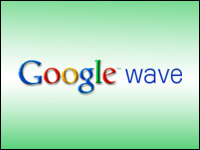
The same developers who gave you Google Maps now think they’ve come up with the single best way for users to navigate all the communication and collaboration tools they currently use on a computer. Judging from some early tech press/blogger reaction, as well as an early thumbs-up from the development community, Google Wave may indeed have the ability to take on not only the most popular office applications, but also the hottest social networks.
The Wave washed over the crowd Thursday at Google’s I/O developer conference in San Francisco, which reportedly gave it a standing ovation. That’s not surprising, given that lead software engineers Lars and Jens Rasmussen said the application is open source, which means developers will get a chance to tinker with it before its release later this year.
So, after two years of research and work in Google’s Australia offices, what is Wave? And in the age of Bing, Twitter, Google and Yahoo, why that name?
“A ‘wave’ is equal parts conversation and document, where people can communicate and work together with richly formatted text, photos, videos, maps and more,” Lars Rasmussen wrote in a Thursday posting on the official Google blog.
“In Google Wave you create a wave and add people to it. Everyone on your wave can use richly formatted text, photos, gadgets and even feeds from other sources on the Web. They can insert a reply or edit the wave directly. It’s concurrent rich-text editing, where you see on your screen nearly instantly what your fellow collaborators are typing in your wave. That means Google Wave is just as well suited for quick messages as for persistent content — it allows for both collaboration and communication.”
Why Google Doesn’t Need Twitter
With Wave, a business large or small can potentially bring under one roof and onto one platform all of its office applications: email, instant messaging, document-sharing and the like. In that respect, Wave continues Google’s cloud-based assault on separate applications like Outlook, Sharepoint, etc.
However, a look at a sample screen grab of Wave may remind you of your Facebook profile or your Twitter feed. The emphasis is on real-time communication, complete with photo- and link-sharing.
The possibilities have excited Lon Safko, longtime business development specialist and author of The Social Media Bible. “They very intelligently looked at the successes of all social media tools — with wikis, photo-sharing, instant messaging, email — and kind of eliminated the shortcomings of each of those and pulled all the assets together into one technology,” Safko told TechNewsWorld.
“It’s a killer app,” he said. “The most exciting thing is that it’s browser-based. You don’t have to download multiple clients and all the other software we’ve had to install and upgrade and pay for each year.”
“Google for a long time has needed a really sexy social product,” IDC social media analyst Caroline Dangson said. “If this isn’t it, I don’t know what is.”
Wave, she said, could be the “next generation of communication,” in that it sweeps across all platforms, including mobile, and adds value to now-traditional forms of conversations, such as email.
“It’s centralized, which is what people kind of want and what Facebook was starting to do: to become this hub or central place to check activity even though it’s occurring all over the Web,” Dangson told TechNewsWorld. “It’s giving users more control in how they communicate and where they communicate.”
In that respect, Wave may have consumer appeal that would match any business uses Google foresees for it, Dangson added, and also create more stickiness for the site. “This is much more interactive, and that’s where the Web is going.”
Will Social Network Users Catch the Wave?
The integration Google has brought to typical business apps like email and the kind favored by social networkers pleases social media analyst Kristen Nicole, author of The Twitter Survival Guide. However, she doesn’t know if there will be a lot of migration by Twitter or Facebook users.
“I wouldn’t say it would take on the social networks,” Nicole told TechNewsWorld. “It does take things to the next level, as Google has tried to give its users more of a social profile, with personalized searches and the like.” The emphasis, though, will be on privacy, she said, and most users who are already using one of the top social networks may not want to give up any more personal info to a new platform, even if it is Google. “I don’t think this will necessarily compete with the other social networks.”
However, the company still stands to benefit from Wave. “For mainstream users, this guarantees much more involvement with other Google apps,” Nicole said.
One possible drawback: the learning curve. Google must make Wave easy to surf, Safko said.
“The problem with social media tools is that they’re time vampires,” she noted. “It can take half a day to get proficient. When you have that many tools in one location, how much time do I have to spend to learn how to use them?”





















































This is a great overview of the new Google Wave. I think Google has done it again! If the the platform is stable, somewhat easy to understand and to use, and we can all be comfortable with the privacy of our information, I think people will begin to migrate over from other social networking sites such as MySpace and Facebook. I think networks such as LinkedIn have such a specific niche they won’t be affected. Then the next question is; how is Google going to monetize the Wave? Will it become the all encompassing "freemium" business model where we will tolerate a minimal AM ount of advertising in exchange for using this app for free and then have the option of "buying" our way out of the advertising with a monthly subscription? I didn’t notice Google’s AdSense, but I AM sure that with the success Google has had with inserting their AdSense into email and web sites, adding AdSense makes good sense. – Lon Safko, Author "The Social Media Bible"